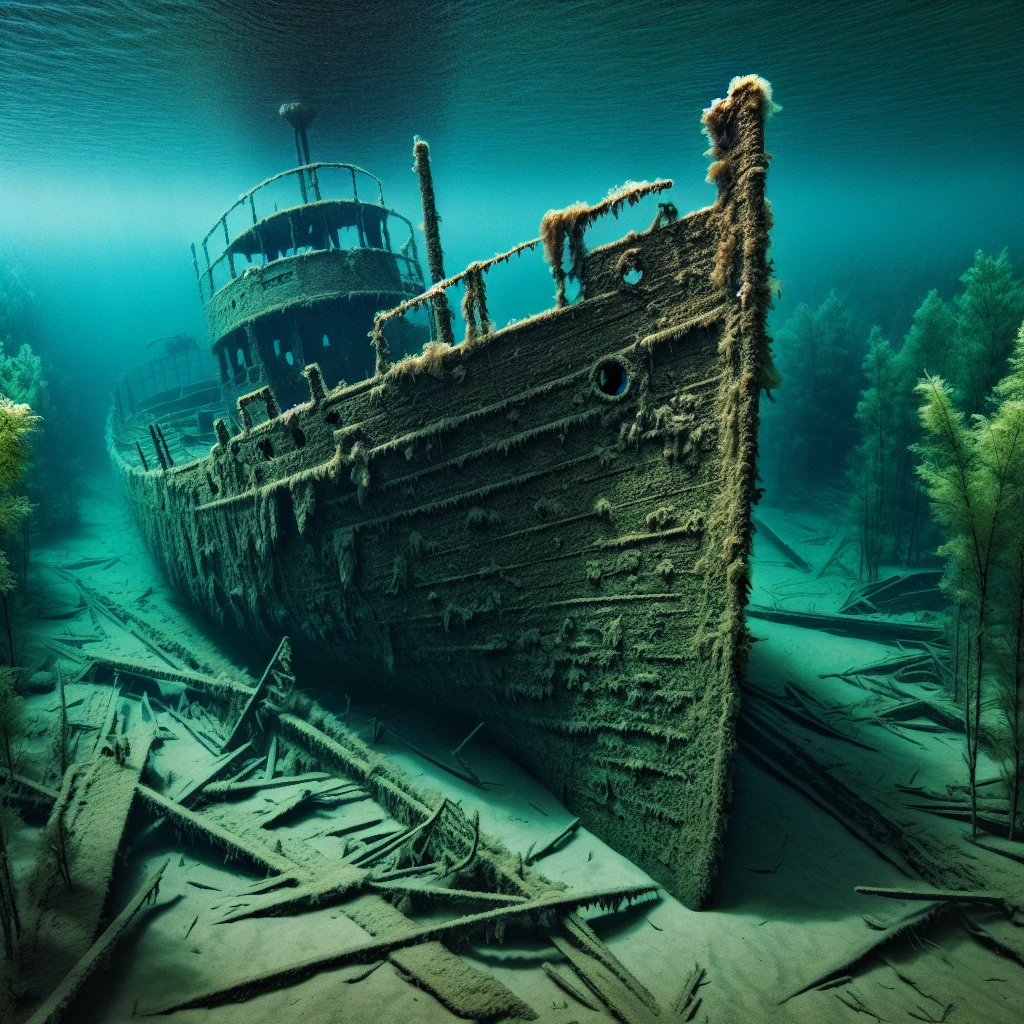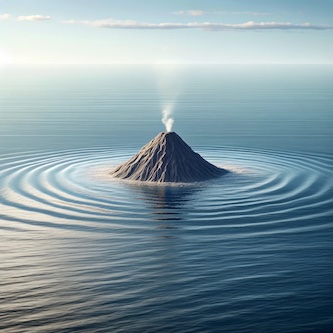Filmmakers Yvonne Drebert and Zach Melnick were searching for invasive mussels in Lake Huron, Canada when they stumbled upon a 128-year-old shipwreck called the ‘Africa.’ The ship, which was carrying coal from Ohio to Ontario, sank on October 4, 1895 and had remained hidden until now.
The discovery of the shipwreck was made by accident while the filmmakers were conducting their research. The ‘Africa’ is a significant find, as it provides a glimpse into the past and offers valuable historical information about maritime trade in the late 19th century.
The filmmakers were exploring the bed of Lake Huron, which is known for its numerous shipwrecks. They were specifically looking for invasive mussels, but instead, they found the well-preserved remains of the ‘Africa.’ The shipwreck is a reminder of the dangers and challenges faced by sailors in the past.
The ‘Africa’ is now being studied by experts to learn more about its history and the circumstances surrounding its sinking. It serves as a reminder of the rich maritime heritage of the Great Lakes region and the stories that lie beneath the surface of the water.
The discovery of the ‘Africa’ shipwreck is a testament to the importance of exploration and the potential for unexpected discoveries. It highlights the significance of preserving and studying historical artifacts to gain a deeper understanding of our past.
Original news source: Filmmakers discover 128-year-old shipwreck (BBC)
Listen
Slow
Normal
Fast
Group or Classroom Activities
Warm-up Activities:
– News Summary
Instructions:
1. Have students read the article individually or in pairs.
2. Ask students to write a summary of the article in their own words, focusing on the key points and main ideas.
3. After a designated amount of time, have students share their summaries with a partner or in small groups.
4. Encourage discussion and ask students to compare their summaries, noting any differences or similarities.
– Opinion Poll
Instructions:
1. Divide the class into small groups.
2. Assign each group a specific topic related to the article (e.g. the importance of exploring shipwrecks, the preservation of historical artifacts, the significance of maritime trade in the past).
3. In their groups, students should discuss their opinions on the topic and come up with at least three reasons to support their stance.
4. After the discussion, have each group present their opinions and reasons to the class.
5. Encourage respectful debate and allow students to ask questions or counter arguments.
– Vocabulary Pictionary
Instructions:
1. Select a list of 10-15 vocabulary words from the article (e.g. invasive, glimpse, maritime, artifacts).
2. Divide the class into small teams.
3. Give each team a set of index cards or whiteboards.
4. Call out a vocabulary word and give the teams a set amount of time (e.g. 30 seconds) to draw a visual representation of the word.
5. After the time is up, have each team hold up their drawings and explain what word it represents.
6. Award points to teams who guess correctly and keep track of the scores throughout the game.
– Pros and Cons
Instructions:
1. Divide the class into two groups: the pros and the cons.
2. Assign each group a stance to take on a specific topic related to the article (e.g. the benefits and drawbacks of exploring shipwrecks).
3. Give students some time to brainstorm and discuss their arguments within their groups.
4. Have each group present their arguments to the class, taking turns presenting one pro and one con at a time.
5. After each group has presented, encourage a class discussion where students can ask questions, counter arguments, and provide additional points.
– Future Predictions
Instructions:
1. Ask students to imagine themselves as historians in the future, studying the ‘Africa’ shipwreck.
2. Have students write a short paragraph or give a brief presentation where they make predictions about what they might discover or learn from the shipwreck.
3. Encourage creativity and critical thinking, and remind students to base their predictions on the information provided in the article.
4. After students have finished, allow them to share their predictions with the class.
5. Facilitate a discussion where students can compare and discuss their predictions, and reflect on the potential impact of the shipwreck’s discovery.
Comprehension Questions:
1. How did filmmakers Yvonne Drebert and Zach Melnick stumble upon the shipwreck called the ‘Africa’?
2. What was the ship carrying when it sank?
3. Why is the discovery of the ‘Africa’ shipwreck significant?
4. What were the filmmakers originally searching for in Lake Huron?
5. What does the discovery of the ‘Africa’ shipwreck remind us of?
6. What are experts currently doing with the ‘Africa’ shipwreck?
7. What does the discovery of the ‘Africa’ shipwreck highlight?
8. Why is it important to preserve and study historical artifacts?
Go to answers ⇩
Listen and Fill in the Gaps:
Filmmakers Yvonne (1)______ and Zach Melnick were searching for invasive mussels in Lake Huron, Canada when they (2)______ upon a 128-year-old (3)______ called the ‘Africa.’ The ship, which was carrying coal from Ohio to Ontario, sank on October 4, 1895 and had remained (4)______ until now.
The discovery of the shipwreck was made by accident while the filmmakers were conducting their research. The ‘Africa’ is a significant find, as it (5)______ a glimpse into the past and offers valuable historical information about (6)______ trade in the late 19th (7)______.
The filmmakers were (8)______ the bed of Lake Huron, which is known for its numerous shipwrecks. They were specifically looking for invasive mussels, but instead, they found the well-preserved (9)______ of the ‘Africa.’ The shipwreck is a reminder of the (10)______ and challenges faced by sailors in the past.
The ‘Africa’ is now being studied by (11)______ to (12)______ more about its history and the circumstances surrounding its sinking. It serves as a reminder of the rich maritime heritage of the Great Lakes region and the stories that lie beneath the surface of the (13)______.
The (14)______ of the ‘Africa’ shipwreck is a testament to the (15)______ of (16)______ and the potential for unexpected discoveries. It highlights the significance of preserving and studying historical artifacts to gain a deeper understanding of our past.
Go to answers ⇩
Discussion Questions:
Students can ask a partner these questions, or discuss them as a group.
1. What is the significance of discovering a 128-year-old shipwreck like the ‘Africa’?
2. How would you feel if you stumbled upon a hidden shipwreck while conducting research?
3. Do you think it is important to preserve and study historical artifacts like the ‘Africa’? Why or why not?
4. Have you ever explored an area known for its historical significance? If so, what did you discover?
5. What challenges do you think sailors faced in the late 19th century?
6. How do you think the discovery of the ‘Africa’ will contribute to our understanding of maritime trade in the 19th century?
7. Do you think exploration is important for making unexpected discoveries? Why or why not?
8. Have you ever had an unexpected discovery while conducting research or exploring? If so, what was it?
9. What do you think can be learned from studying shipwrecks like the ‘Africa’?
10. How do you think the discovery of the ‘Africa’ shipwreck will impact the Great Lakes region?
11. What other historical artifacts do you think could be hidden beneath bodies of water?
12. Do you think there are other significant shipwrecks waiting to be discovered? Why or why not?
13. How do you think the ‘Africa’ shipwreck will be studied by experts?
14. What other ways can we gain a deeper understanding of our past?
15. Do you think the discovery of the ‘Africa’ shipwreck will lead to more exploration in Lake Huron? Why or why not?
Individual Activities
Vocabulary Meanings:
Match each word to its meaning.
Words:
1. shipwreck
2. filmmakers
3. Lake Huron
4. invasive mussels
5. hidden
6. historical information
7. sailors
8. exploration
Meanings:
(a) The remains of a sunken or wrecked ship
(b) Not easily seen or noticed
(c) Non-native mussels that cause harm to an ecosystem
(d) A large lake in North America
(e) Facts or details about the past
(f) The act of searching or investigating something new
(g) People who make films
(h) People who work on ships
Go to answers ⇩
Multiple Choice Questions:
1. How did filmmakers Yvonne Drebert and Zach Melnick discover the shipwreck?
(a) By accident while searching for invasive mussels
(b) Through a tip from a local historian
(c) By using advanced sonar technology
(d) By following a treasure map
2. When did the ‘Africa’ shipwreck sink?
(a) October 4, 1995
(b) October 4, 1795
(c) October 4, 2095
(d) October 4, 1895
3. What was the ‘Africa’ ship carrying when it sank?
(a) Coal
(b) Gold
(c) Passengers
(d) Food supplies
4. What is the main significance of the ‘Africa’ shipwreck?
(a) It is the oldest shipwreck ever discovered
(b) It contains a hidden treasure
(c) It provides historical information about maritime trade in the late 19th century
(d) It is a reminder of the dangers of invasive mussels
5. What were the filmmakers originally searching for in Lake Huron?
(a) Shipwrecks
(b) Invasive mussels
(c) Historical artifacts
(d) Sunken treasure
6. What is currently happening to the ‘Africa’ shipwreck?
(a) It is being left untouched as a historical monument
(b) It is being studied by experts to learn more about its history
(c) It is being salvaged for its valuable cargo
(d) It is being used as a tourist attraction
7. What does the discovery of the ‘Africa’ shipwreck highlight?
(a) The dangers of sailing on Lake Huron
(b) The need for more research on invasive mussels
(c) The decline of maritime trade in the late 19th century
(d) The importance of exploration and unexpected discoveries
8. What does the article suggest about the Great Lakes region?
(a) It is home to many hidden treasures
(b) It is a dangerous place for sailors
(c) It has a rich maritime heritage
(d) It is a popular destination for filmmakers
Go to answers ⇩
True or False Questions:
1. Experts are currently studying the ‘Africa’ shipwreck to learn more about its history and the circumstances surrounding its sinking.
2. The ‘Africa’ shipwreck rose on October 4, 1895, while carrying coal from Ohio to Ontario.
3. Filmmakers Yvonne Drebert and Zach Melnick accidentally discovered a 128-year-old shipwreck called the ‘Africa’ while searching for invasive mussels in Lake Huron, Canada.
4. The filmmakers were conducting research in Lake Huron, known for its scarcity of shipwrecks.
5. The discovery of the ‘Africa’ shipwreck provides valuable historical information about maritime trade in the late 19th century.
6. The discovery of the ‘Africa’ shipwreck minimizes the rich maritime heritage of the Great Lakes region.
7. The ‘Africa’ shipwreck is well-preserved and offers a glimpse into the dangers and challenges faced by sailors in the past.
8. The destruction of the ‘Africa’ shipwreck diminishes the importance of preserving and studying historical artifacts to gain a deeper understanding of our past.
Go to answers ⇩
Write a Summary:
Write a summary of this news article in two sentences.
Check your writing now with the best free AI for English writing!
Writing Questions:
Answer the following questions. Write as much as you can for each answer.
Check your answers with our free English writing assistant!
1. How did filmmakers Yvonne Drebert and Zach Melnick stumble upon the 128-year-old shipwreck called the ‘Africa’?
2. Why is the discovery of the ‘Africa’ shipwreck significant?
3. What were the filmmakers originally searching for in Lake Huron?
4. What challenges did sailors in the late 19th century face, as demonstrated by the discovery of the ‘Africa’ shipwreck?
5. Why is the study of historical artifacts like the ‘Africa’ shipwreck important for gaining a deeper understanding of the past?
Answers
Comprehension Question Answers:
1. How did filmmakers Yvonne Drebert and Zach Melnick stumble upon the shipwreck called the ‘Africa’?
– They stumbled upon the shipwreck while they were searching for invasive mussels in Lake Huron, Canada.
2. What was the ship carrying when it sank?
– The ship was carrying coal from Ohio to Ontario when it sank.
3. Why is the discovery of the ‘Africa’ shipwreck significant?
– The discovery of the ‘Africa’ shipwreck is significant because it provides valuable historical information about maritime trade in the late 19th century and offers a glimpse into the past.
4. What were the filmmakers originally searching for in Lake Huron?
– The filmmakers were originally searching for invasive mussels in Lake Huron.
5. What does the discovery of the ‘Africa’ shipwreck remind us of?
– The discovery of the ‘Africa’ shipwreck reminds us of the dangers and challenges faced by sailors in the past.
6. What are experts currently doing with the ‘Africa’ shipwreck?
– Experts are currently studying the ‘Africa’ shipwreck to learn more about its history and the circumstances surrounding its sinking.
7. What does the discovery of the ‘Africa’ shipwreck highlight?
– The discovery of the ‘Africa’ shipwreck highlights the importance of exploration and the potential for unexpected discoveries.
8. Why is it important to preserve and study historical artifacts?
– It is important to preserve and study historical artifacts to gain a deeper understanding of our past and to preserve our cultural heritage.
Go back to questions ⇧
Listen and Fill in the Gaps Answers:
(1) Drebert
(2) stumbled
(3) shipwreck
(4) hidden
(5) provides
(6) maritime
(7) century
(8) exploring
(9) remains
(10) dangers
(11) experts
(12) learn
(13) water
(14) discovery
(15) importance
(16) exploration
Go back to questions ⇧
Vocabulary Meanings Answers:
1. shipwreck
Answer: (a) The remains of a sunken or wrecked ship
2. filmmakers
Answer: (g) People who make films
3. Lake Huron
Answer: (d) A large lake in North America
4. invasive mussels
Answer: (c) Non-native mussels that cause harm to an ecosystem
5. hidden
Answer: (b) Not easily seen or noticed
6. historical information
Answer: (e) Facts or details about the past
7. sailors
Answer: (h) People who work on ships
8. exploration
Answer: (f) The act of searching or investigating something new
Go back to questions ⇧
Multiple Choice Answers:
1. How did filmmakers Yvonne Drebert and Zach Melnick discover the shipwreck?
Answer: (a) By accident while searching for invasive mussels
2. When did the ‘Africa’ shipwreck sink?
Answer: (d) October 4, 1895
3. What was the ‘Africa’ ship carrying when it sank?
Answer: (a) Coal
4. What is the main significance of the ‘Africa’ shipwreck?
Answer: (c) It provides historical information about maritime trade in the late 19th century
5. What were the filmmakers originally searching for in Lake Huron?
Answer: (b) Invasive mussels
6. What is currently happening to the ‘Africa’ shipwreck?
Answer: (b) It is being studied by experts to learn more about its history
7. What does the discovery of the ‘Africa’ shipwreck highlight?
Answer: (d) The importance of exploration and unexpected discoveries
8. What does the article suggest about the Great Lakes region?
Answer: (c) It has a rich maritime heritage
Go back to questions ⇧
True or False Answers:
1. Experts are currently studying the ‘Africa’ shipwreck to learn more about its history and the circumstances surrounding its sinking. (Answer: True)
2. The ‘Africa’ shipwreck rose on October 4, 1895, while carrying coal from Ohio to Ontario. (Answer: False)
3. Filmmakers Yvonne Drebert and Zach Melnick accidentally discovered a 128-year-old shipwreck called the ‘Africa’ while searching for invasive mussels in Lake Huron, Canada. (Answer: True)
4. The filmmakers were conducting research in Lake Huron, known for its scarcity of shipwrecks. (Answer: False)
5. The discovery of the ‘Africa’ shipwreck provides valuable historical information about maritime trade in the late 19th century. (Answer: True)
6. The discovery of the ‘Africa’ shipwreck minimizes the rich maritime heritage of the Great Lakes region. (Answer: False)
7. The ‘Africa’ shipwreck is well-preserved and offers a glimpse into the dangers and challenges faced by sailors in the past. (Answer: True)
8. The destruction of the ‘Africa’ shipwreck diminishes the importance of preserving and studying historical artifacts to gain a deeper understanding of our past. (Answer: False)
Go back to questions ⇧













